Albanese ‘shedding authority like fur from a sick cat’
This week the PM gave us sycophancy and cowardice on China – averting his eyes as Cheng Lei was bullied by Chinese officials in Parliament House – and silliness and scares on nuclear energy.
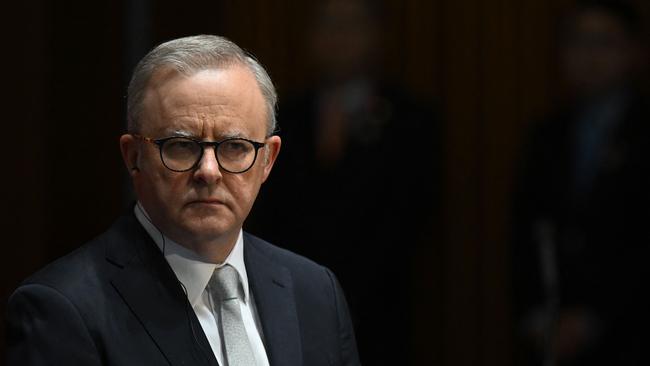
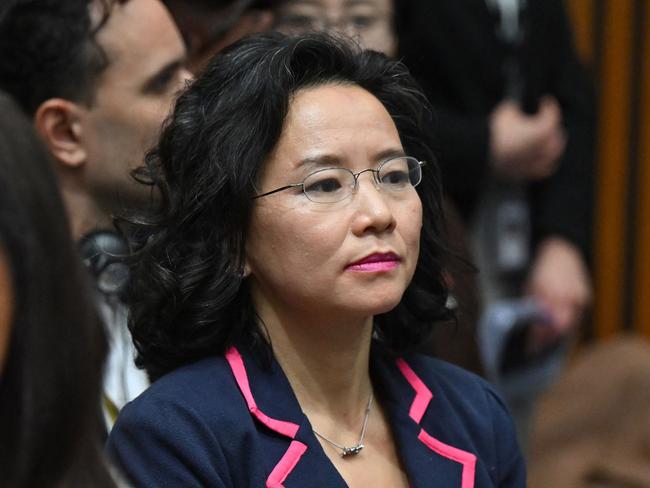
Albanese gave us sycophancy and cowardice on China, and silliness and scares on nuclear energy. If Albanese wanted to confirm voters’ doubts about him, he hardly could have done a better job.
He seemed to behave more like a prime minister when he was running a controlled, small-target strategy as opposition leader. Now, in office, Albanese cheapens his own standing with snide, oppositionist politicking, and we see the authority of office shed from his bearing like fur from a sick cat.
According to Labor’s longstanding rhetoric, climate change is the most critical challenge facing the planet and, according to practical reality, managing our energy transition to net zero is the most crucial economic challenge of our generation. Yet Albanese and his team have responded to a serious proposal to meet this challenge by taking this nation into the nuclear age with little else but cheap derision and puerile social media memes.
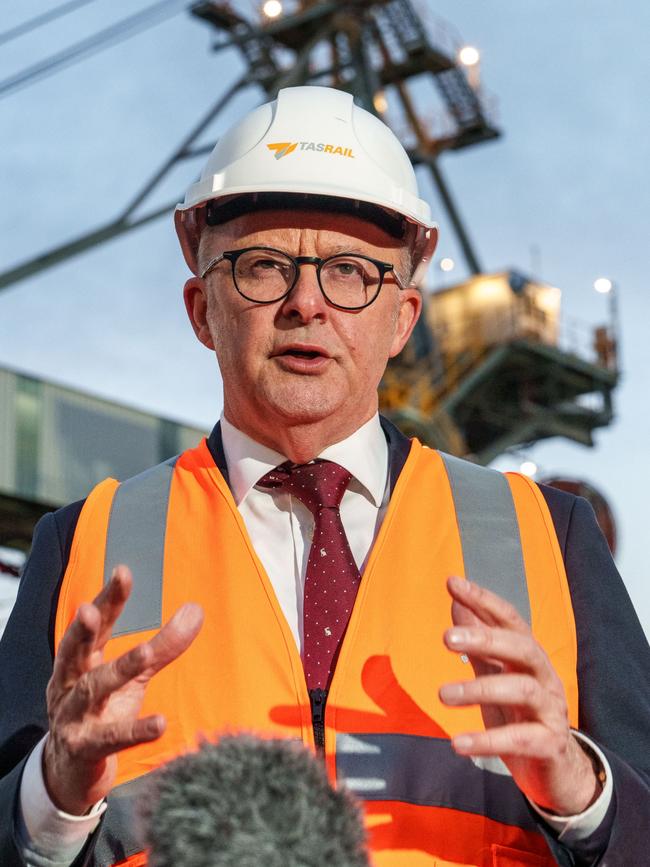
Anyone tempted to think that Labor, the Greens and the teals are more interested in virtue signalling than engineering, preferring stunts to reliable energy, will only have had their fears confirmed. The country is being run by people about as sensible and informed on these issues as Greta Thunberg.
There is much that needs to be interrogated in Peter Dutton’s nuclear energy plan, including costings, reactor models, workforce capability, government ownership and interim energy alternatives. But all of these are serious topics where there are plausible options and reasonable debates to be had.
Instead, Albanese has spoken about an “economic catastrophe”, a “radioactive sledgehammer”, and he has reinvented Snow White and the Seven Dwarfs as “Peter Dutton and the seven nuclear reactors”. Talk about dopey.
Labor MPs, ministers, premiers and officials are taking to social media with mock-ups of three-eyed fish and Blinky Bill with the same mutation. Forget getting our kids off social media, we need to ban our politicians.
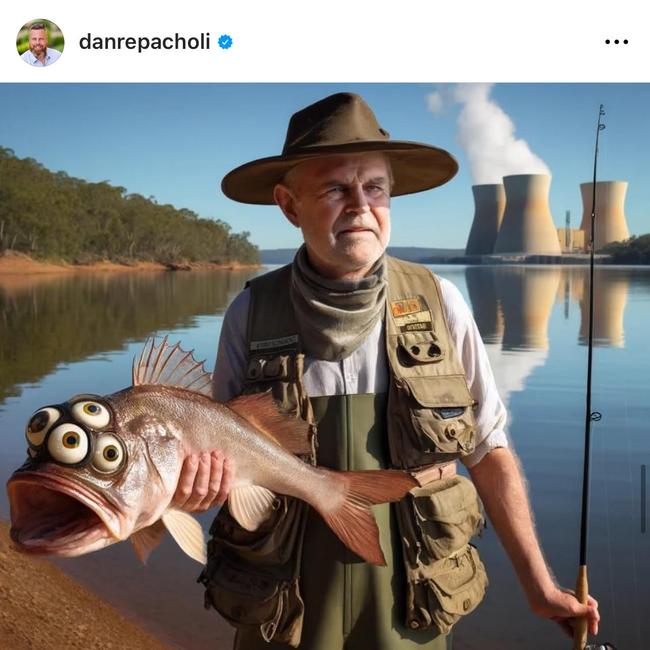
The central point of this debate is one that tends to be ignored. It is the question of whether the current Labor, Greens and teal plan of renewables plus storage can deliver both the goal of net-zero emissions and a reliable and affordable electricity grid.
Almost everything hinges on the answer to this question. Because unless it is needed for energy requirements, our belated embrace of a domestic nuclear industry may hardly be worthwhile – it would ensure our workforce and economy were more modern and sophisticated, and support the AUKUS nuclear-powered submarines project, but the step up from our current nuclear medicine and research capability might not be worth the effort.
On the other hand, if the renewables-plus-storage model is too expensive and unwieldy, and cannot deliver secure supplies, then we had better find an alternative. What is understood by too few people – because most of the media runs the Labor, Greens and teal lines on these issues – is that no other country is attempting to do what Australia is doing. We are in the middle stages of a monumental, world-first experiment.
And we are in deep strife.
The nation has surrendered its prime economic advantage of cheap, reliable power. We were a true energy superpower, exploiting plentiful domestic energy and exporting vast amounts of coal, gas and uranium.
Now we have a domestic energy supply and price crisis, and under the Labor, Greens and teal plan we will refuse to use at home these three energy resources we readily export. This is national energy self-harm on a grand scale.
Labor, the Greens, the teals, the ABC and the activists tell us that if we keep investing ever more tens of billions of dollars into renewables, batteries and transmission we will start to get lower prices and more reliable power. Experience, engineering and weather patterns tell us otherwise.
Just as the International Energy Agency tells us that net zero cannot be achieved without nuclear power, it also finds we cannot make the renewable transition with existing technology – up to half the task relies on technologies not yet invented or at least not implemented at commercial scale. Not only is Australia in strife but we also are betting our whole economy on an untried model.
Our suspicions should be raised by the fact no other country is attempting to race us down this path. Increasingly, countries that are installing large amounts of renewable energy are bolstering their nuclear capacity – this includes France, Britain, South Korea, Finland, the US, Canada and even China.
Given Australia’s inconsequential contribution to global emissions, we should be taking our time on emissions reduction. Our timetable can have no discernible impact on the global climate, so the sensible path is to concentrate on getting our energy decisions right, not rushing them.
Nuclear was probably always our best option; from the moment we decided to decarbonise our fixed energy grid we should have planned a domestic nuclear power industry. It is inevitable because it is the only proven baseload, zero-emissions technology.
Given we are moving to nuclear-powered submarines it is a no-brainer. We should look to process uranium ourselves so that we embed sovereign energy security. The voices lined up against nuclear are those who have aligned themselves financially, politically and ideologically with a renewables zealotry that transcends practical reality. They are noisy but their arguments lack a rational underpinning.
Not only do they promote a costly and risky model that exposes the nation to costly and insecure power supplies but they also are stuck with a renewable project and transmission line rollout that will alienate vast areas of the countryside and coastline, triggering opposition from communities across the land.
Albanese and Labor would be better placed to accept the need for nuclear and pledge to embark on that path in tandem with renewables. The trouble is they have become prisoners to their own rhetoric, to the renewables investors and to the ideological madness of the Greens.
The Opposition Leader’s bold nuclear shift has pushed Labor into a corner with the loony tunes lefties. Voters will be given a clear choice: a medium-term plan that makes sense or more of the same.
The Prime Minister has even questioned the nation’s ability to deliver a nuclear reactor, retreating to a position of national self-loathing where he reckons this country is not clever enough to sustain a nuclear industry.
He seems to have completely forgotten the two reactors built and commissioned at Lucas Heights, and the expertise that has grown up around them across seven decades.
It is simply not good enough for a significant country to have a government bleating about three-eyed fish and suggesting we are incapable of building and running what Canada, South Korea, France and many other nations have handled for decades. Voters are unlikely to buy this form of self-doubt and Albanese is unlikely to recover his stocks by running down the country he leads.
Earlier this month the latest update to the Australian Energy Market Operator’s annual Electricity Statement of Opportunities confirmed that: “Reliablity gaps are forecast in all mainland NEM (National Electricity Market) regions in the next decade.” In other words demand is outstripping supplies and we are confronting blackouts and supply disruptions.
Just to be clear, AEMO is all in on renewables and an instrumental agency in delivering the renewables-plus-storage model. And it says we’re running short of power.
The answer from Labor, the Greens, the teals and AEMO is to double down on renewables and transmission. This is an eye-wateringly expensive proposition, estimated by Net Zero Australia to cost $1500bn. While Albanese and Labor complain about a lack of costings from the Coalition on the nuclear plan, they have never provided costings for their plan.
Dutton is promising to provide costings for his nuclear plan in coming days. Still, the CSIRO’s recent costings on nuclear suggest a maximum cost per reactor of $16bn and likely half that per unit – so we can conclude the cost of the Coalition’s seven plants will be somewhere between $60bn and $100bn to be spent between 2025 and 2050.
That is about 10 per cent of what the Labor, Greens and teals renewables experiment will cost. And it is a capital cost on assets that will operate for at least 75 years, while the renewables infrastructure will need to be replaced at least once every 25 years.
It is hard to make an argument against nuclear on the known facts. Which is why the critics immediately mutated to nonsense. Dutton is doing the nation a great service offering an opportunity to reclaim our energy advantage and become a more modern, sophisticated economy. He has succeeded in turning the federal election into a cost-of-living and nuclear energy referendum. And Dutton’s referendum record is strong.
The debate has a long way to go, but in the opening days the Opposition Leader has forced his Labor opponents to make right fools of themselves.



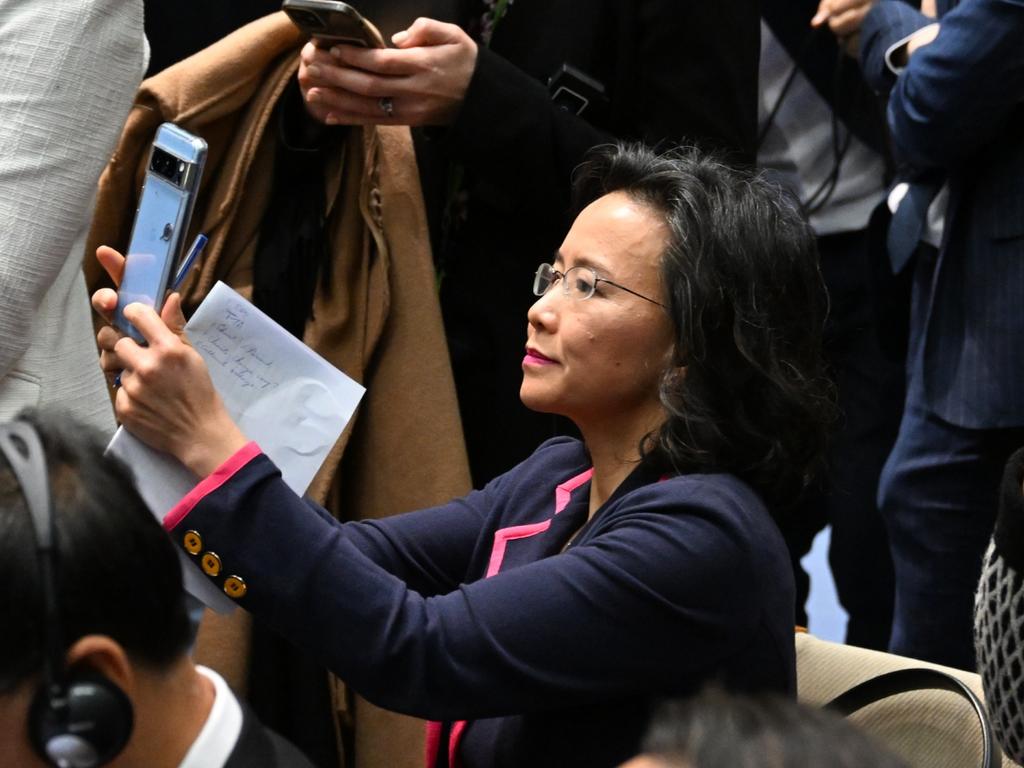
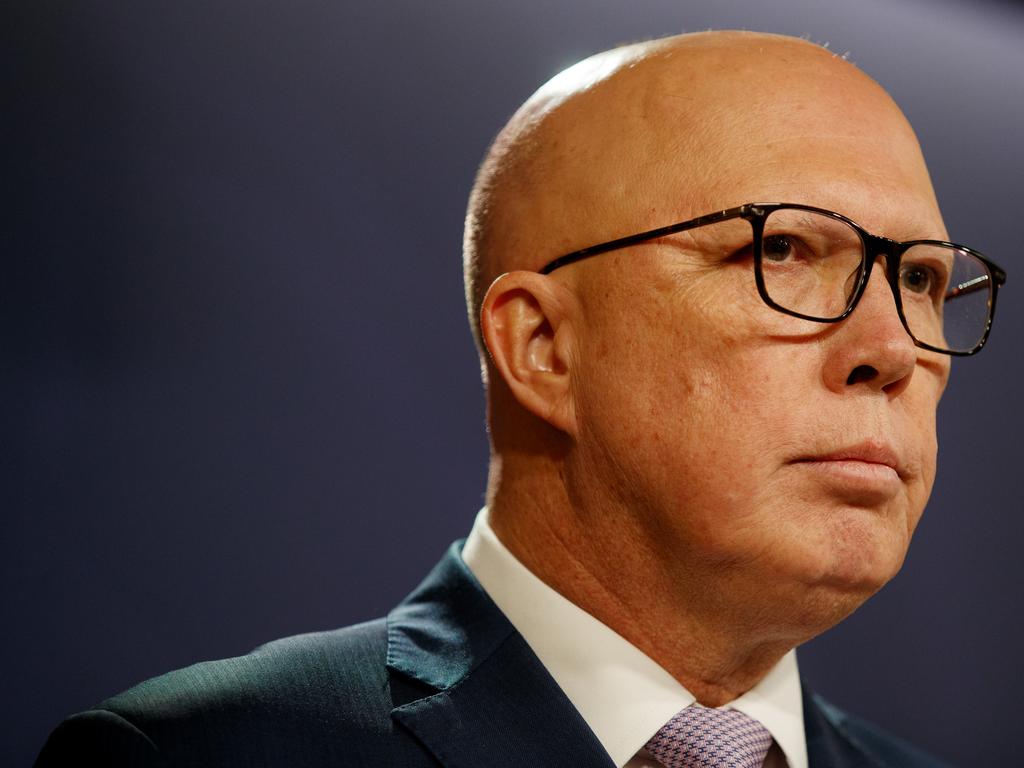
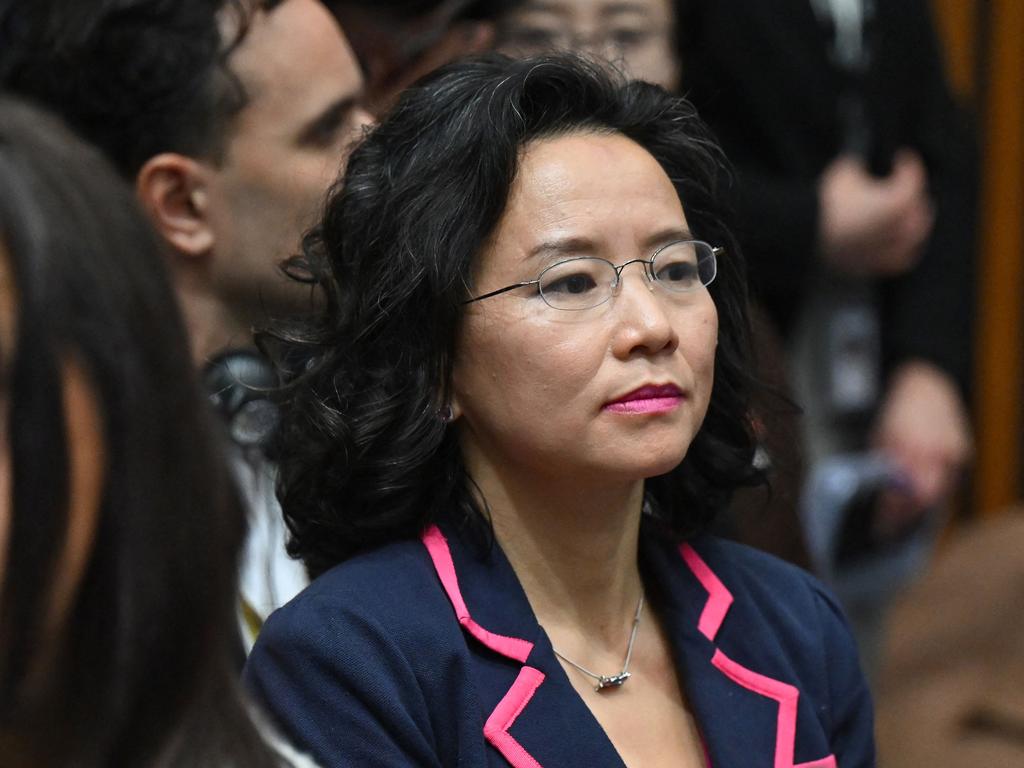


What a terrible week for Anthony Albanese and the nation. The Prime Minister averted his eyes on Monday as Chinese-Australian journalist Cheng Lei was bullied by Chinese officials in Parliament House, and on Thursday he endorsed three-eyed fish as a legitimate motif of fear in the nation’s most consequential policy debate in decades.